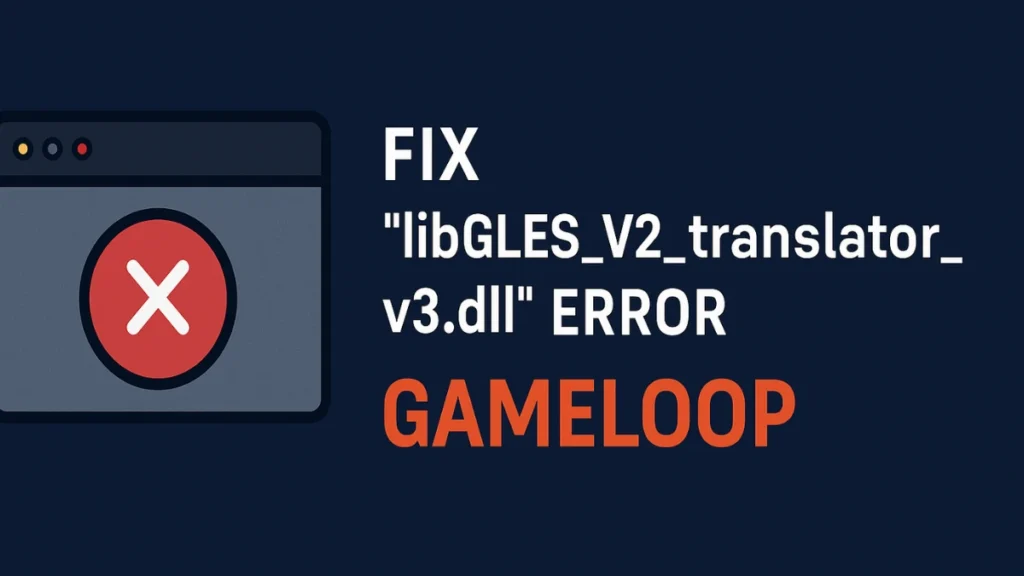If you’re encountering the libGLES V2 translator v3.dll error while launching or using GameLoop. This issue commonly occurs due to corrupted or missing DLL files, outdated GPU drivers, or system configuration conflicts.

Why This Error Occurs
The file libGLES V2 translator v3.dll is part of GameLoop’s graphics rendering system, responsible for handling OpenGL and DirectX translation. When this file is missing, corrupted, or blocked, the emulator fails to initialize rendering—leading to crashes or startup failures.
Below are multiple methods to resolve the issue, arranged from most essential to advanced solutions.
1. Reinstall GameLoop with a Clean Setup
Starting with a clean install ensures that all required components—including the problematic DLL—are restored properly.
Here’s how to do it safely:
- Uninstall GameLoop from
Control Panel > Programs > Uninstall a Program. - Delete residual folders:
C:\Program Files\TxGameAssistant\C:\TxGameAssistant\(if exists)
- Download the latest GameLoop version from the official site and install it.
- After installation, run GameLoop as Administrator to avoid permission issues.
This step alone fixes the issue for most users.
2. Update Your Graphics Drivers
Graphics drivers are crucial for any emulator. If they’re outdated or improperly installed, rendering DLLs like libGLES_V2_translator_v3.dll might malfunction.
Here’s what you need to do:
- For NVIDIA Users:
- Open GeForce Experience, go to the Drivers tab, and click Check for Updates.
- For AMD Users:
- Use AMD Adrenalin Software to update your drivers.
- For Intel Graphics:
- Visit Intel Driver Support and auto-detect updates.
After updating, restart your PC to apply the changes.
3. Manually Replace the Missing DLL
If reinstalling and updating didn’t work, the file might still be missing or corrupted. In that case, you can manually restore it.
Before doing this, understand the risk of downloading DLLs from third-party sites. Only use trusted platforms and always match the version with your system architecture (32-bit or 64-bit).
Steps:
- Download the DLL file from a reliable source like:
- Place the downloaded file in:
C:\Program Files\TxGameAssistant\UI\orC:\TxGameAssistant\UI\ - Restart GameLoop.
4. Use System File Checker to Repair System Files
Sometimes, corrupted Windows system files may prevent GameLoop from working correctly.
You can repair these files by using the System File Checker:
- Open Command Prompt as Administrator.
- Run this command:
sfc /scannow - Wait for the scan to complete. If it finds and fixes corrupted files, restart your PC and relaunch GameLoop.
5. Temporarily Disable Antivirus Software
Security software like Windows Defender, Avast, or BitDefender may mistakenly block emulator components, including .dll files.
Try this:
- Disable real-time protection or pause your antivirus temporarily.
- Reinstall GameLoop while antivirus is off.
- Launch GameLoop to check if the issue persists.
Important: Re-enable your antivirus afterward and consider adding GameLoop to the exclusion list.
6. Change GameLoop’s Emulator Settings
If the root of the problem lies in rendering mode, adjusting GameLoop’s internal settings might help.
Follow these steps:
- Open GameLoop and go to Settings > Game Settings.
- Enable Force Dedicated GPU (if your system supports it).
- Try switching Graphics Rendering Mode:
- From Smart Mode to OpenGL or DirectX.
- Save settings and restart the emulator.
This change has helped many users bypass the libGLES_V2_translator_v3.dll crash by selecting a more stable rendering backend.
7. Consider Using Alternative Emulators
If none of the above steps work, and GameLoop continues to throw the same error, switching to another Android emulator might be a practical solution.
Reliable alternatives include:
- BlueStacks – bluestacks.com
- LDPlayer – ldplayer.net
- MEmu Play – memuplay.com
Each has its own system requirements and features, so choose the one best suited for your hardware setup.
Final Thoughts
The libGLES_V2_translator_v3.dll error in GameLoop is primarily a graphics-related issue that stems from either system-level problems or emulator-specific corruption. Start by updating your drivers and performing a clean reinstall. Only resort to manually replacing DLLs when absolutely necessary, and avoid downloading from unreliable sources.
If the problem persists, checking Windows logs via Event Viewer or exploring alternative emulators can help continue your gaming experience without interruption.
Read More:
How to Fix “Failed to Load xgameruntime.dll – Error Code 126” on Windows 10/11
How to Fix isdone.dll and unarc.dll Error -1 in Windows (Easy Guide)

